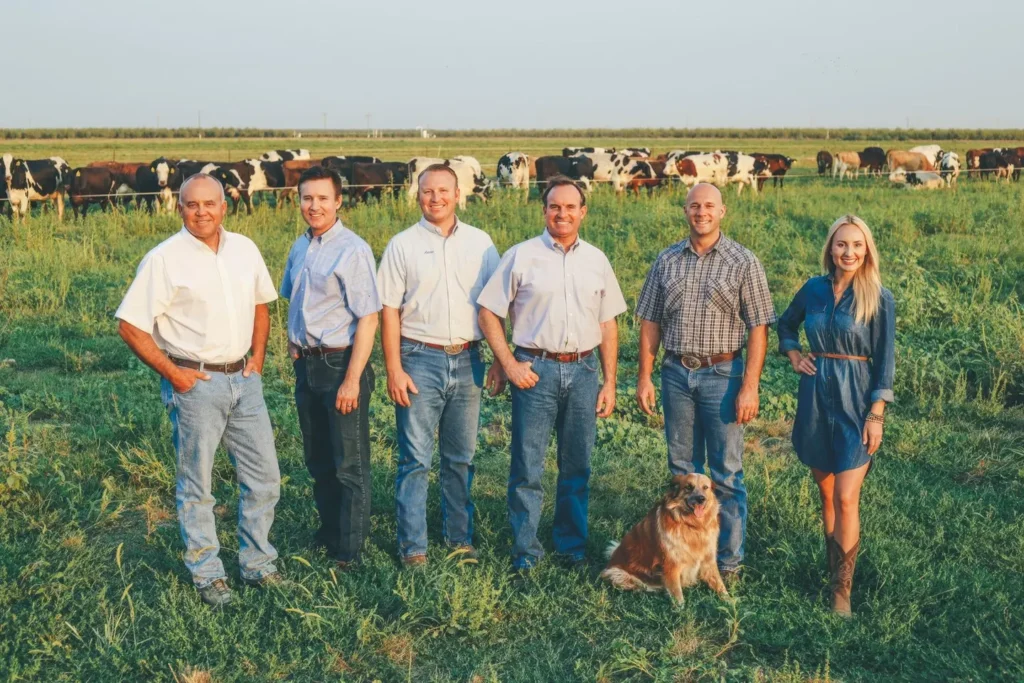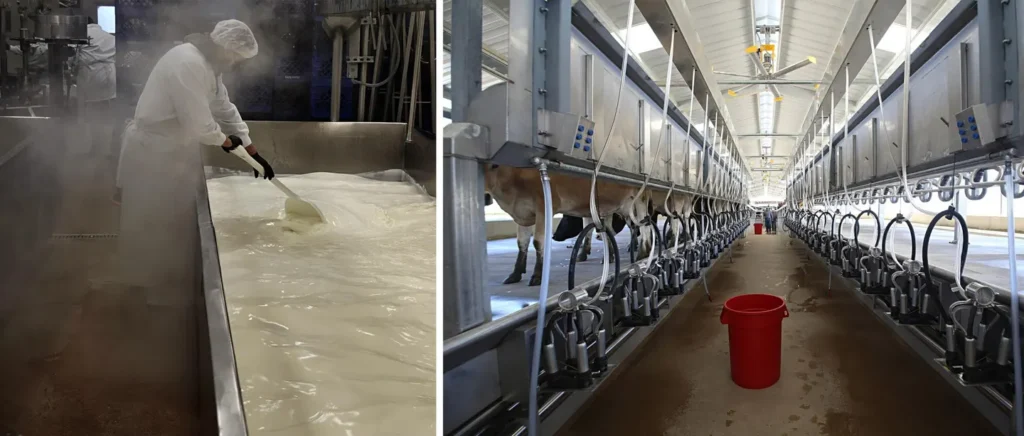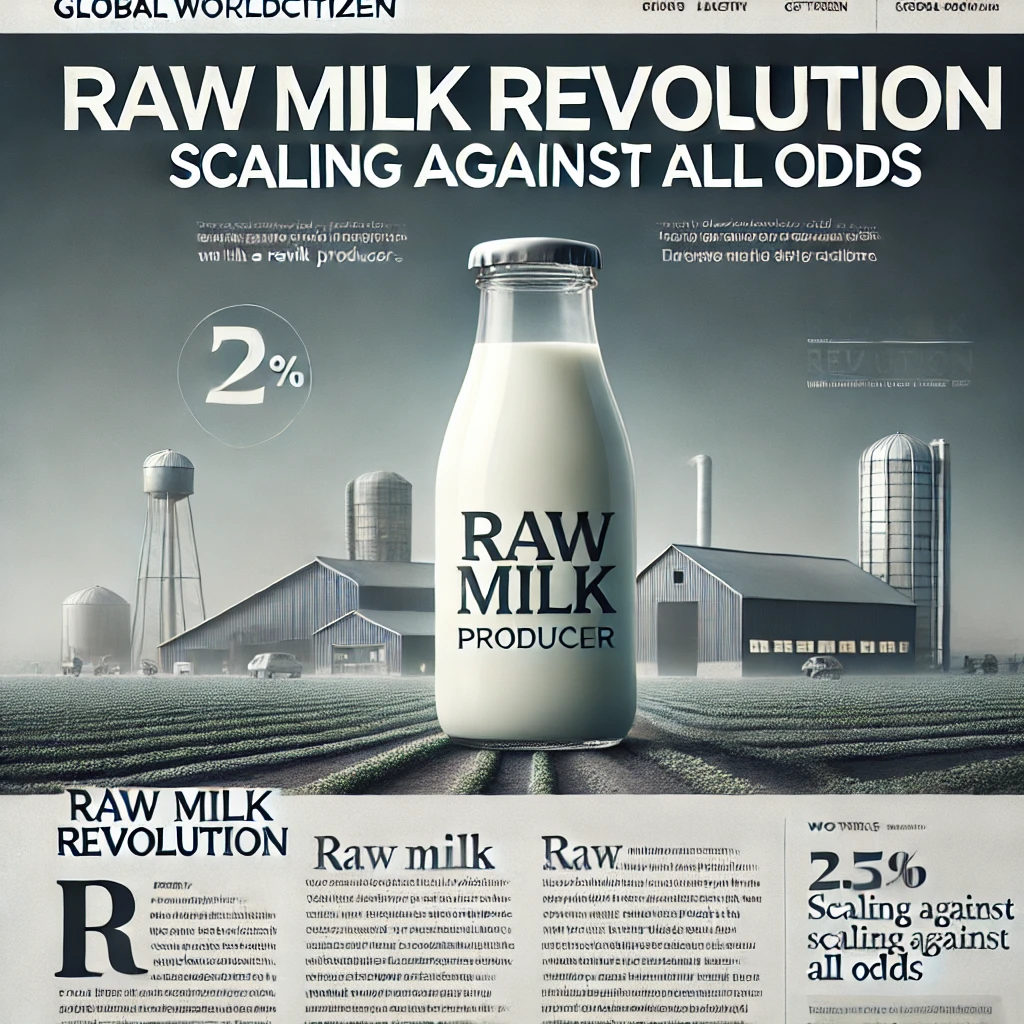Dec 21, 2024
Mark McAfee hopes to become the chief advisor on raw milk in the next Trump Administration. The cofounder and CEO of Raw Farm, the country’s largest producer that’s been at the center of raw milk recalls in California, said he’s in discussion about the role and hoped to help Robert F. Kennedy Jr., a raw milk proponent who’s been nominated as the next Secretary of Health and Human Services, set standards on raw milk that would ensure safe production, while allowing more distribution of it.
“I’m the raw milk guy,” Mark McAfee, 63, said in a telephone interview, adding, “I’m the only guy that knows this stuff.”
It’s been a moment for the raw milk industry and for Fresno, California-based Raw Farm. First, Raw Farm recalled several batches of its milk and cream after testing by the California Department of Public Health found bird flu virus in samples of its milk. Then it shut its dairies while its herd is under quarantine. Over the past few weeks, the drumbeat of news about bird flu went from bad to worse, as the virus spread to cats and to people, with a child in California testing positive (from an unknown source) and a person in Louisiana being hospitalized with severe illness (likely exposed from a backyard flock). On December 18, with the California state agriculture department having found the virus in 645 dairy herds, California Governor Gavin Newsom declared an emergency.
Raw Farm’s family farmers aren’t backing down in their belief in the benefits of raw milk, which propelled the 100% family-owned business to sales of more than $30 million. With RFK Jr.’s nomination, they’re hoping to sell a lot more. Raw Farm’s president Aaron McAfee, Mark’s 40-year-old son, said that he expected sales to reach $100 million within three years, and that he was already thinking about product expansions. “One of our greatest value adds right now is that we specialize in making a product that everybody in the traditional industry says is impossible,” Aaron McAfee said. “Nobody believes you can do raw milk at scale.”

The McAfee family at Raw Farm's pasture: (left to right) Mark McAfee, Adam McAfee, Aaron McAfee, Eric McAfee, Josh Stanziani and Kaleigh Stanziani, with Ruby the dog
Federal health regulators have consistently warned about the dangers of consuming raw milk, citing data from the Centers for Disease Control and Prevention (CDC) that shows 2,645 illnesses and 228 hospitalizations linked to raw milk between 1998 and 2018. While legal in some states and illegal in others, it is always unlawful to transport raw milk across state lines for human consumption. (Transporting it for pet consumption is treated differently.) California, where Raw Farm operates, is one of 15 states where retail sales of raw milk are permitted, making it a hotspot for the raw milk movement. This movement has united advocates of organic food, who tout raw milk’s perceived health benefits, and libertarians who champion the right to make personal dietary choices free from government oversight.
“Food is medicine is ringing true to the customers,” said Mark McAfee, founder of Raw Farm and the Raw Milk Institute, who identifies as a Bernie Sanders/Jill Stein Democrat. McAfee added, “Our consumers are saying, ‘Screw you, FDA, we want raw milk.’”
Raw milk has long sparked controversy due to the risk of harboring pathogens such as salmonella and campylobacter, which can cause severe gastrointestinal issues. Since French scientist Louis Pasteur developed pasteurization in 1862—a process that heats milk to at least 145 degrees Fahrenheit to kill harmful bacteria—pasteurized milk has become the standard in the U.S.
“There’s a whole slew of bacterial infections that can arise from unpasteurized milk,” said Dr. Amesh Adalja, a senior scholar at the Johns Hopkins Center for Health Security.
The recent H5N1 bird flu outbreak has added another layer of concern. Pasteurization effectively neutralizes the virus, making pasteurized milk safe to drink, according to the CDC. However, the exact mechanism of bird flu transmission through raw milk remains unclear. Scientists are particularly concerned about the potential for the virus to mutate into a form that could spread between humans.
“A lot of this is hypothetical but grounded in real biological principles,” Dr. Adalja explained. “This is why we’re taking a highly aggressive approach to addressing the infection risk in raw milk at this time.”
The McAfee family stumbled upon raw milk by chance but became ardent advocates over time, navigating regulatory challenges and legal battles along the way. To ensure safety, the company has invested in its own pathogen testing lab, complete with PCR machines to detect infections in their bulk milk tanks daily and in their cows weekly.
For Mark McAfee, the bird flu outbreak is just another challenge to manage. While the family’s herds remain under quarantine, they’ve partnered with a dairy farm in uninfected northern California to maintain supply. According to Aaron McAfee, raw milk from the partner dairy is expected to hit shelves by Monday. In the meantime, milk from their quarantined herds is being sent for pasteurization until restrictions are lifted.
“Mother Nature is going to take her course, and I respect that,” Mark McAfee remarked. “When we emerge, we’ll have two dairies full of antibodies, and our consumers won’t be able to get enough.

Raw Farm's industrial scale raw milk production: making cheese (left) and milking cows.Raw Farm
Their farming journey wasn’t without hardship. As teenagers, the brothers discovered their father had taken on significant federal loans for drilling wells, leaving the family $4 million in debt when the wells failed. The land was collateral, but the brothers fought to save it. “Our brother’s ashes and our family legacy were on this land, and we were determined to make it work,” said Eric McAfee. After a decade of legal battles, they settled for $500,000 in 1988. “It taught us the most important thing in entrepreneurship: persistence,” added Eric, who later pursued a successful career in Silicon Valley.
The family initially farmed apples and alfalfa before transitioning to an organic dairy in the late 1990s. In 1999, after a major raw milk producer in Los Angeles closed, Mark McAfee started receiving calls from customers seeking raw milk. Inspired by the demand, Mark and his wife Blaine began delivering unprocessed milk in their white Suburban SUV to Venice, Los Angeles. The response was overwhelming, with eager customers clamoring for the product.
Recognizing the opportunity, the McAfees expanded their operations, building a creamery and diversifying into raw butter, raw cheese, and raw kefir. Today, a gallon of raw milk sells for approximately $18 in California, compared to $4.50 for regular milk. “Dad is the pioneering, visionary leader of raw milk,” said Mark’s son, Aaron. The business has consistently turned a profit, bolstered by strong margins.
However, their success has often put them at odds with regulators. Over the years, the McAfees have faced multiple legal battles, including a 2008 criminal case for violating federal food laws by shipping raw milk labeled as pet food to out-of-state customers. In 2023, they signed a consent decree agreeing not to make medical claims about their products to avoid further penalties.
Despite frequent shutdowns by state and federal regulators, the family has remained resilient. Eric McAfee estimates he has invested $10 million of his own money to sustain the business through regulatory hurdles. “Every time we’re shut down, it’s a massive financial hit, but we persevere,” he said.
In 2018, under Aaron’s leadership, Raw Farm outlined a five-year growth plan, which included acquiring a second dairy and increasing livestock. The Covid-19 pandemic unexpectedly boosted sales, as consumers sought alternative ways to strengthen their immune systems. “Our message of building a strong immunity resonated,” said Aaron, though the FDA disputes raw milk’s health claims.
The recent bird flu outbreak has added to their challenges, with herds quarantined and milk temporarily diverted for pasteurization. Yet, the McAfees remain optimistic. “Every time we face adversity, revenues eventually increase,” said Eric. The family is now looking to expand its brand into other simple, raw products like unprocessed orange juice.
Despite being a 100% family-owned business, the McAfees have resisted offers from venture capitalists, though they are open to selling a minority stake under the right conditions.
“We’re not typical dairymen,” Mark McAfee remarked. “We’re connected to our consumers and driven by different values. It’s just in our DNA.”

